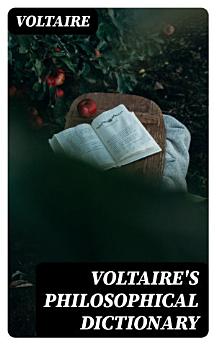Voltaire's Philosophical Dictionary
сеп 2022. · DigiCat
E-knjiga
284
Stranica
family_home
Ispunjava uslove
info
reportOcene i recenzije nisu verifikovane Saznajte više
O ovoj e-knjizi
In "Voltaire's Philosophical Dictionary," the esteemed Enlightenment thinker critiques and examines a range of philosophical topics, from religion and morality to science and government. Employing a distinct literary style characterized by wit, irony, and eloquent prose, Voltaire's work serves as both a compendium of Enlightenment thought and a caustic commentary on societal norms. Each entry is infused with his trademark skepticism, encouraging readers to question established doctrines and consider alternative perspectives, ensuring that the text resonates within the broader context of 18th-century intellectual discourse. Voltaire, born François-Marie Arouet, was a prolific writer, historian, and philosopher whose life experiences—marked by censorship, exile, and advocacy for civil liberties—shaped his critical perspective. His encounters with religious dogma and abuses of power fueled his desire to promote reason and tolerance. "Philosophical Dictionary" reflects his commitment to intellectual freedom and the examination of life's profound questions, reinforcing the values of the Age of Enlightenment and underscoring the importance of critical inquiry. This book is an essential read for anyone seeking to engage deeply with the philosophical questions that define humanity. Voltaire's sharp insights and articulate arguments invite readers to reflect on their own beliefs and the world around them, making it a timeless resource for philosophy enthusiasts and students alike.
O autoru
François-Marie Arouet, known by his nom de plume Voltaire, was a towering figure of the French Enlightenment, whose contributions to literature, philosophy, and history remain a timeless legacy. Born on November 21, 1694, in Paris, France, Voltaire established himself as a writer and a wit, unafraid to skewer the establishment and advocate for civil liberties and separation of church and state. Voltaire's oeuvre is expansive, encompassing plays, poems, novels, essays, and historical and scientific works, that challenge conventions and inspire critical thinking. Among his most notable work is 'Voltaire's Philosophical Dictionary' (1764), a seminal encyclopedic work, comprised of a series of essays that form a broad critique of traditional religion and the injustices of the time. The 'Philosophical Dictionary' is both a compendium of Enlightenment thought and an embodiment of Voltaire's literary style—marked by acerbic wit, irony, and clarity of reason. Throughout his career, Voltaire used his sharp pen to advocate for reason, progress, and freedom of expression, leaving an indelible mark on the world of letters. His influence extended beyond the pages, impacting social and political thought. Voltaire passed away on May 30, 1778, but his writings continue to engage scholars and readers alike in the fundamental questions of liberty, justice, and human happiness.
Ocenite ovu e-knjigu
Javite nam svoje mišljenje.
Informacije o čitanju
Pametni telefoni i tableti
Instalirajte aplikaciju Google Play knjige za Android i iPad/iPhone. Automatski se sinhronizuje sa nalogom i omogućava vam da čitate onlajn i oflajn gde god da se nalazite.
Laptopovi i računari
Možete da slušate audio-knjige kupljene na Google Play-u pomoću veb-pregledača na računaru.
E-čitači i drugi uređaji
Da biste čitali na uređajima koje koriste e-mastilo, kao što su Kobo e-čitači, treba da preuzmete fajl i prenesete ga na uređaj. Pratite detaljna uputstva iz centra za pomoć da biste preneli fajlove u podržane e-čitače.








